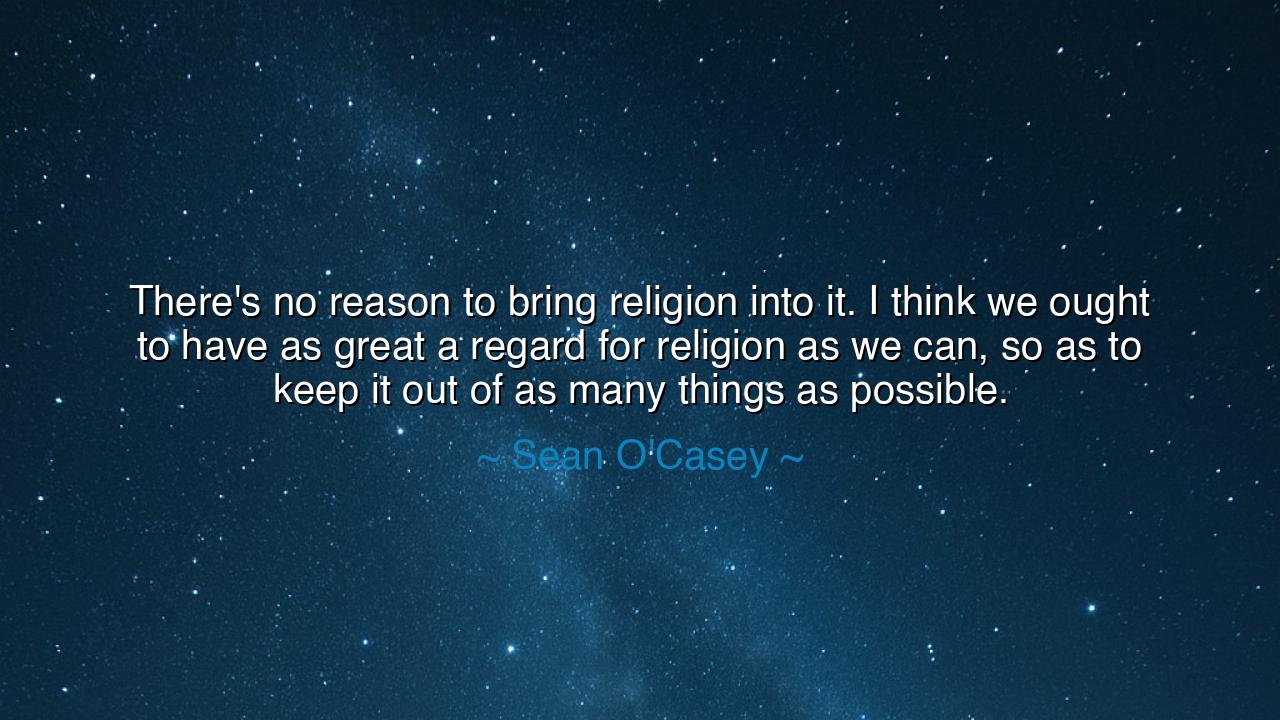
There's no reason to bring religion into it. I think we ought to
There's no reason to bring religion into it. I think we ought to have as great a regard for religion as we can, so as to keep it out of as many things as possible.






In the labyrinth of human life, the influence of religion is both vast and ancient. It shapes societies, defines cultures, and for many, offers a pathway to understand the mysteries of existence. Yet, in the words of Sean O'Casey, "There's no reason to bring religion into it. I think we ought to have as great a regard for religion as we can, so as to keep it out of as many things as possible," we are reminded of a critical tension that exists between religion as a guiding force and its potential to encroach upon the affairs of the world. O'Casey calls for a balance, a respect for faith, but also a caution against allowing it to dominate the many aspects of life that should remain free from religious interference. This sentiment invites us to reflect on the delicate dance between faith and reason, between spirituality and the practical matters of human existence.
The ancients, in their wisdom, understood the need for balance in how religion interacted with the state and the individual. In ancient Greece, Socrates famously criticized the influence of religion on governance, often questioning whether the gods should be used as justification for political power or war. His defense of reason over blind faith led him to clash with the religious authorities of his time, culminating in his trial and execution. Socrates did not reject the gods, but he sought to separate divine authority from the realm of human reason and justice. This tension between religion and society is one that O'Casey echoes in his own statement. It is not a call to dismiss faith, but a plea to ensure that reason and action are not subjugated to the whims of religious dogma.
Similarly, Plato in his Republic envisioned a society where philosophy and reason guided political decisions, with religion relegated to the realm of personal belief rather than state governance. Plato believed that truth and justice could be better understood through philosophical inquiry and the pursuit of wisdom, rather than relying on the gods to dictate the moral code of society. In this way, Plato’s philosophy aligned with O'Casey's caution: religion, while a personal source of solace and guidance, should not unduly interfere with the practical affairs of society and the state. Religion, in Plato's view, had its place but should not impose itself on the moral and political structures that governed human interaction.
The Reformation of the 16th century also provides a powerful example of the risks of religion intertwined with politics. The Protestant Reformation, led by figures like Martin Luther, arose as a reaction against the dominance of the Catholic Church in matters of both faith and state. Luther’s assertion that faith alone, not the church’s authority, was the means of salvation directly challenged the power structures of his time. The wars of religion that followed in Europe reflected the destructive potential when faith and politics became too closely intertwined. O'Casey’s words serve as a warning about the dangers of allowing religion to influence the public sphere to the extent that it overrides the pursuit of peace, reason, and individual freedom.
In contrast, we also see examples throughout history where the separation of faith and state allowed for greater harmony. One such example is the United States, where the First Amendment of the Constitution enshrined the freedom of religion while ensuring that religion would not dominate the government. This separation allowed for a diverse society in which individuals were free to practice their faith without it dictating the laws of the land. The success of this system lies in the recognition that while religion can provide moral guidance, it must not impose its dogma on the governance of a society that includes a multitude of beliefs and philosophies.
The lesson of O'Casey’s words is not an attack on religion, but a call for wisdom in how we allow faith to influence our lives and the world around us. Religion, in its purest form, is meant to be a personal journey, a source of comfort, guidance, and community. It should be respected and cherished for its ability to uplift the soul, but it should not overshadow the need for rational discourse and universal principles of justice. To live harmoniously in a diverse world, we must learn to respect the space between the personal and the public, ensuring that faith does not cloud our ability to engage with others in reasoned dialogue and to act justly without the imposition of religious authority.
In our own lives, we can take O'Casey’s caution to heart. Let us respect the role of religion in our own hearts and in the lives of others, while ensuring that it does not infringe upon the spaces of reason, freedom, and shared humanity. We must strive for a world where faith and reason coexist, where individuals are free to follow their spiritual beliefs, but where those beliefs do not prevent the flourishing of a society that respects diversity, freedom, and peace. Through such a balance, we can build a world that is not divided by faith, but united in our shared commitment to justice, peace, and human dignity.






AAdministratorAdministrator
Welcome, honored guests. Please leave a comment, we will respond soon